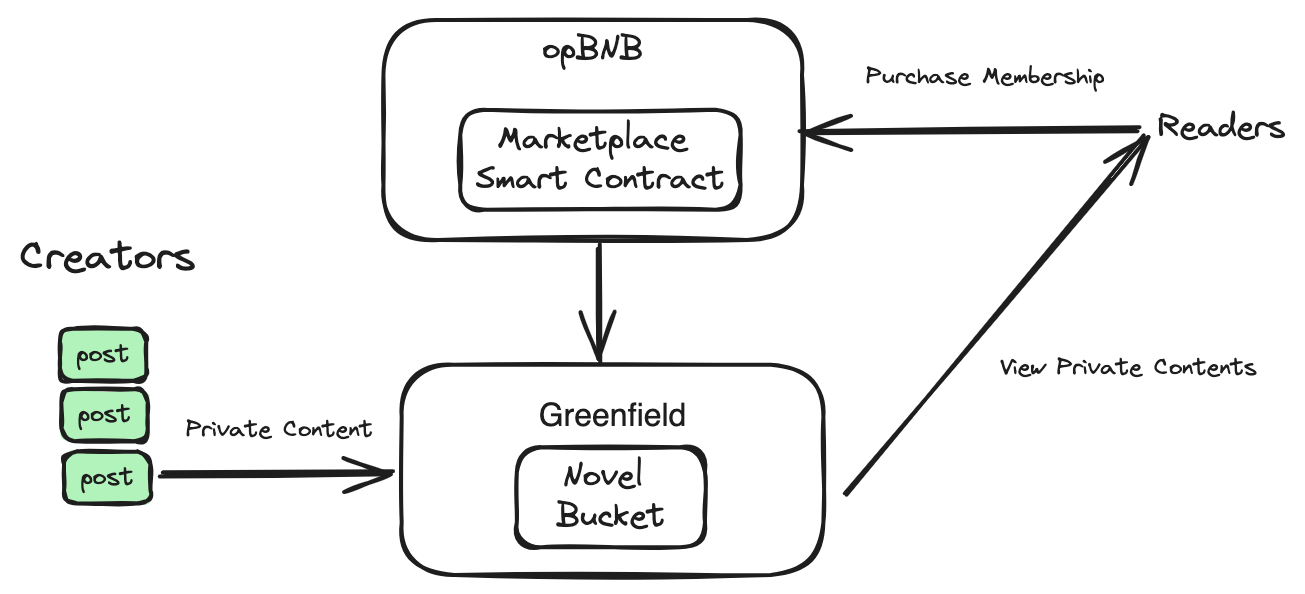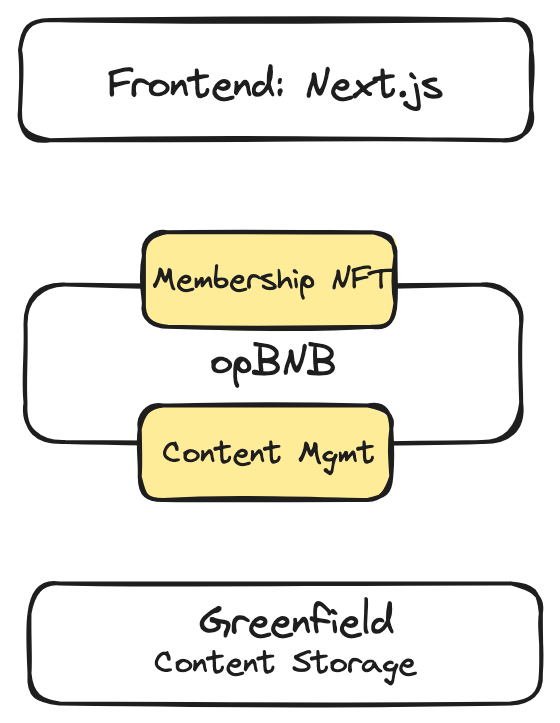Introduction
Decentralized social networks or DeSoc, unlike their centralized counterparts, function on blockchain-based platforms and empower users by enabling them to exchange information and create and distribute content to audiences.
What you will learn
In this tutorial, we'll provide a step-by-step guide on how to develop a DeSoc dApp on BNBChain. The demo shows how writers can upload chapters of their novels, interact with their readership, and monetize their work in a secure and transparent environment.

Solution architecture
- Decentralized Publishing: Authors can directly upload their novels without the need for traditional publishing intermediaries, ensuring full control over their content and copyrights.
- Customized Access: The access control feature of BNB Greenfield ensures full control over their content and copyrights. Authors can design different reader groups for different content. This feature encourages readership growth.
- Tokenized Chapters: By leveraging the smart contract on opBNB, membership to reader groups is tokenized and listed for sale. Readers can purchase access to exclusive content using cryptocurrency.
Build a Fully On-chain DeSoc App
Content Creators User Journey
- Writers sign up, create a profile, and upload their work immediately. Each creator will create a separate bucket for storing
- The platform provides tools for formatting, membership management, and tokenization.
- Authors can track their sales, interact with readers, and withdraw their earnings directly to their cryptocurrency wallets.
Readers User Journey
- Discover novels/writers: Utilize platform tools to find and follow writers based on interests or trending topics.
- Subscription: Pay tokens to purchase membership NFT, enabling access to exclusive content and interactions.
- Access Exclusive Content: View unique insights and posts.
Tech Implementations

The DeSoc dApp is composed of three main parts.
- Smart Contracts deployed on opBNB: NovelChain employs smart contracts to manage membership, ensuring authors receive their earnings instantly and transparently with each sale. Readers can purchase membership access to view chapters of a novel.
- Frontend pages: Authors can directly upload their novels without the need for traditional publishing intermediaries. Readers can view the exclusive content after becoming a member.
- Content Storage: Greenfield is a decentralized storage solution. Writers have full control over their content and copyrights.
Smart contract development
Preparation
Environment Setup
Download and install smart contract
To start a new project with Foundry, use forge init:
$ forge init hello_foundry
This creates a new directory hello_foundry from the default template. This also initializes a new git repository.
// install dependencies
forge install bnb-chain/greenfield-contracts@v1.2.0 --no-commit
forge install bnb-chain/greenfield-contracts-sdk@v1.1.0 --no-commit
forge install OpenZeppelin/openzeppelin-contracts --no-commit
forge install OpenZeppelin/openzeppelin-contracts-upgradeable --no-commit
Import the desired contracts
In novel.sol, add the following imports
pragma solidity ^0.8.0;
import "@bnb-chain/greenfield-contracts/contracts/interface/IERC721NonTransferable.sol";
import "@bnb-chain/greenfield-contracts/contracts/interface/IERC1155NonTransferable.sol";
import "@bnb-chain/greenfield-contracts/contracts/interface/IGnfdAccessControl.sol";
import "@bnb-chain/greenfield-contracts-sdk/GroupApp.sol";
import "@openzeppelin/contracts/access/AccessControl.sol";
import "@openzeppelin/contracts/security/ReentrancyGuard.sol";
import "@openzeppelin/contracts-upgradeable/utils/structs/EnumerableMapUpgradeable.sol";
import "@openzeppelin/contracts-upgradeable/utils/structs/DoubleEndedQueueUpgradeable.sol";
Override functions
Define and override the greenfieldCall, retryPackage and skipPackage functions if your dApp needs callback. You can route calls with the help of the internal method:
function greenfieldCall(
uint32 status,
uint8 resourceType,
uint8 operationType,
uint256 resourceId,
bytes calldata callbackData
) external override(GroupApp) {
require(msg.sender == _GROUP_HUB, "Novel: invalid caller");
if (resourceType == RESOURCE_GROUP) {
_groupGreenfieldCall(status, operationType, resourceId, callbackData);
} else {
revert("Novel: invalid resource type");
}
}
Define the main functions
Next you need to define the main functional parts of the app. You can send cross-chain request to system contracts with the help of internal functions like below:
function listChapter(uint256 novelGroupId, uint256 chapterGroupId, uint256 price) public onlyNovelExist(novelGroupId) onlyGroupOwner(chapterGroupId) {
// the owner need to approve the Novel contract to update the group
require(IGnfdAccessControl(_GROUP_HUB).hasRole(ROLE_UPDATE, msg.sender, address(this)), "Novel: no grant");
require(prices[chapterGroupId] == 0, "Novel: already listed");
require(price > 0, "Novel: invalid price");
novels[novelGroupId].chapterGroupIds.push(chapterGroupId);
prices[chapterGroupId] = price;
emit List(msg.sender, novelGroupId, chapterGroupId, price);
}
Define other view functions, internal functions and access control system according to your own needs.
Smart Contract Deployment
- Setup Environment Variables
cp .env.example .env
Setup your own OP_PRIVATE_KEY and OWNER_PRIVATE_KEY .
The OP_PRIVATE_KEY is the account that's responsible for deploying the contract and the OWNER_PRIVATE_KEY is the contract's owner. For convenience, you can use a same account.
- Install
git clone --recurse-submodules https://github.com/bnb-chain/novel-contract.git && cd novel-contract
yarn
forge install
- Deploy
forge script ./script/1-deploy.s.sol --rpc-url ${RPC_TESTNET} --legacy --broadcast --private-key ${OP_PRIVATE_KEY}
Frontend Deployment
Download repository from here
install dependencies
pnpm install
- Build packages:
pnpm build
- Run the demo application
npm run dev
Demo In Action
Create Novel
Once you have deployed the smart contract, writers can execute the following commands to create contents.
- Create and Mirror Group
// create a group and get the id from the output
./build/gnfd-cmd --config ${CONFIG_PATH} group create gnfd://${GROUP_NAME}
// grant permission to the group
./build/gnfd-cmd --config ${CONFIG_PATH} policy put --groupId ${GROUP_ID} --actions get grn:o::${YOUR_BUCKET_NAME}/${YOUR_OBJECT_NAME}
// mirror the group to opBNB testnet
./build/gnfd-cmd --config ${CONFIG_PATH} group mirror --id ${GROUP_ID} --destChainId 5611
- Allow writers to create novels where subscribers can receive messages without direct interaction
// use the same account that create bucket and object on greenfield
cast send ${proxyNovel}
"createNovel(uint256,string)" <group id of the novel> "Novel Name"
--rpc-url ${RPC_TESTNET}
--from ${ACCOUNT_AUTHOR}
--private-key ${PK_AUTHOR}
- List contents on opBNB
use the same account that create bucket and object on greenfield
list a chapter with price 1BNB
cast send ${proxyNovel}
"listChapter(uint256,uint256,uint256)" <group id of novel> <group id of chapter> 1000000000000000000
--rpc-url ${RPC_TESTNET}
--from ${ACCOUNT_AUTHOR}
--private-key ${PK_AUTHOR}
Pay to view chapters
Readers can execute the following commands: call the smart contract to become a member of a group by paying tokens.
- Readers pay to view chapters of a book
// subscribe from the buyer account
cast send ${proxyNovel}
"buy(address,uint8)()" ${ACCOUNT_AUTHOR} <group id of chapter>
--value ${PRICE}+${RELAYER_FEE}
--rpc-url ${RPC_TESTNET}
--from ${ACCOUNT_BUYER}
--private-key ${PK_BUYER}
- Use Callback function to make sure the cross-chain tx is successful. Example on testnet can be found here. You can see that ERC1155 NFT is minted and transferred to subscriber.
You can find the full implementation here.
Closing Thoughts
In this tutorial, we discussed the numerous advantages of DeSoc applications on BNBChain and provided a step-by-step guide on how to develop a dApp similar to Pareon on opBNB and Greenfield. By leveraging the opBNB's high-speed and low-cost transaction processing capabilities, developers can create robust and scalable DeSoc applications that can handle a large number of users and transactions.
Join us on this transformative journey, and contribute to the evolution of Web3.
Codebase
- Frontend https://github.com/bnb-chain/greenfield-js-sdk/tree/main/examples/browser-file-management
- Smart Contract https://github.com/bnb-chain/novel-contract
Resources
- BSC Faucet:
Greenfield:
Documents: https://docs.bnbchain.org/greenfield-docs/docs/guide/home
Bridge: https://greenfield.bnbchain.org/en/bridge?type=transfer-in
Explorer : https://greenfieldscan.com
UI dApp: https://dcellar.io/
Cross-chain Permission Control